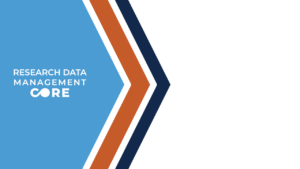UNC Research Data Management Core
The Research Data Management Core (RDMC) provides UNC researchers with the necessary tools, knowledge, and support to manage and share their research data in compliance with funding agency mandates and data sharing policies effectively and efficiently.
Who We Are
In 2013, the Office of Science and Technology Policy issued a memo to increase public access to federally funded research. This memorandum stipulated that ‘the direct results of federally funded scientific research are made available to and useful for the public, industry, and the scientific community.’ In response to this mandate, federal funding agencies adopted data management and sharing policies requiring researchers to outline how the outputs from funded projects will be shared.
Recently, an update to this memorandum has been released prompting funding agencies to increase their guidance and data sharing policy requirements to ensure that publications and their underlying data are made available without embargo or fees. Some funding agencies, such as the NIH and NSF, have already responded with updates to their requirements for data sharing.
Data are critical and essential components in furthering scientific inquiry and advancements in research. UNC is committed to ensuring compliance with data sharing mandates and to furthering public access to research outputs. As such, the Research Data Management Core has been established with the purpose of supporting and guiding research data management across campus. Originally part of The Odum Institute for Research in Social Science, the staff of the Research Data Management Core have well over thirty years of experience in providing data management services to the UNC research community. Our expertise in data management, data sharing, data preservation, data curation, data storage, data security, and data repositories will aid UNC researchers in navigating these new funding agency requirements.
What We Do
| UNC Dataverse: Support self-archiving of data <2TB per project, long-term preservation of data and documentation, persistent identifiers for published data, and access controls and customizable terms of use |
| Training and Education: Conduct workshops, training for project teams, and educational materials on data management best practices, data management tools, and data policy compliance |
| DMSP Review and Consultations: Provide feedback and guidance on writing data management and sharing plans in compliance with funding agency mandates |
| Tools for Data Management: Maintain access and support to various tools such as UNC Dataverse, DMPTool, Qualitative Data Repository, and OSF for research data management and sharing |
| Network Building: Develop connections to units across campus that provide data management, data storage, data security, and data preservation solutions |
| Development Solutions: Develop technical and/or workflow solutions to bridge gaps in data management and sharing needs |
| Policy Implementation: Create, guide, and implement of UNC data policies to comply with funding agency mandates, open science initiatives, and reproducible research practices |
News
- Presentations to Faculty Council and OSP RAFTs
 As part of our ongoing outreach efforts, the Research Data Management Core (RDMC) recently provided presentations during the Joint Meeting of the General Faculty and Faculty Council as well as … Read more
As part of our ongoing outreach efforts, the Research Data Management Core (RDMC) recently provided presentations during the Joint Meeting of the General Faculty and Faculty Council as well as … Read more - Clarification on DMSP submissions from the UNC Research Data Management Core
 From Jonathan Crabtree, Director — UNC Research Data Management Core We have been made aware that the information regarding data management and sharing plan (DMSP) audits and review on our … Read more
From Jonathan Crabtree, Director — UNC Research Data Management Core We have been made aware that the information regarding data management and sharing plan (DMSP) audits and review on our … Read more - Updates on the Research Data Management Core Support and Resources
 Several months ago, we announced a new initiative to address research data management needs across the University with the establishment of a new Research Data Management Core (RDMC). We are … Read more
Several months ago, we announced a new initiative to address research data management needs across the University with the establishment of a new Research Data Management Core (RDMC). We are … Read more - Building a Comprehensive Model for Supporting Research Data Management
 Data are a critical asset that are the foundation of most scholarly outputs. Federal and non-federal sponsors have become increasingly focused on ensuring that all universities and principal investigators become … Read more
Data are a critical asset that are the foundation of most scholarly outputs. Federal and non-federal sponsors have become increasingly focused on ensuring that all universities and principal investigators become … Read more
